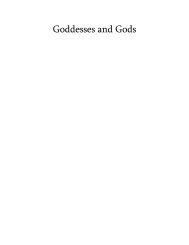- Page 1 and 2:
Herbs, Flowers and Trees
- Page 3 and 4:
making of sachets. A Good Sized Tea
- Page 5 and 6:
ground ivy round the edge. Special
- Page 7 and 8:
This is the easiest method. Making
- Page 9 and 10:
can alter the patient's emotional s
- Page 11 and 12:
Infant/Child skin care (M,W); Cough
- Page 13 and 14:
Cedar Internal cleansing (B) Lung c
- Page 15 and 16:
Cocoa Depression, Calm, Heartache (
- Page 17 and 18:
Asthma, Hypertension (C) Intestinal
- Page 19 and 20:
Burns, Eczema (W,T,C) Wounds, Spasm
- Page 21 and 22:
Fatigue, Aches & Pains, Rheumatism,
- Page 23 and 24:
(Use Spearmint for the same reasons
- Page 25 and 26:
Get an apple. Cut this apple into a
- Page 27 and 28:
Teas for Colds and Coughs: To help
- Page 29 and 30:
Parsley Tea to Stimulate the Kidney
- Page 31 and 32:
Body Body Lice Lice: Lice oil of be
- Page 33 and 34:
7) Healing - used to promote wholen
- Page 35 and 36:
Damiana Sandalwood Dragon's Blood S
- Page 37 and 38:
Advice to the Beginning Herbalism S
- Page 39 and 40:
Allspice Allspice (Pimento dioica)
- Page 41 and 42:
To grow: Deciduous or partly evergr
- Page 43 and 44:
Pour a cup of boiling water over tw
- Page 45 and 46:
Parts used: Ripe seeds. Collect the
- Page 47 and 48:
To Grow: Perennial. In areas with m
- Page 49 and 50:
Part used: Dried aerial parts. Coll
- Page 51 and 52:
Mouthwash: Pour one pint of boiling
- Page 53 and 54:
Infusion: Pour one cup of boiling w
- Page 55 and 56:
they are the size you want. Uses: T
- Page 57 and 58:
is just above soil level. After the
- Page 59 and 60:
Caution: Caution: Rue's oil is a po
- Page 61 and 62:
Dose: In constipation, in powder fo
- Page 63 and 64:
An Herb Garden for Bees Did you kno
- Page 65 and 66: An Introduction to the Doctrine of
- Page 67 and 68: The Doctrine of Signatures naturall
- Page 69 and 70: the Damascus Rose or the Apple Blos
- Page 71 and 72: Aphrodisiacs Aphrodisiacs! The word
- Page 73 and 74: You must then age the whole thing f
- Page 75 and 76: Use Use when when moon moon is is i
- Page 77 and 78: Astragalus Membranaceous and White
- Page 79 and 80: Subjects: Twelve healthy volunteers
- Page 81 and 82: Specifically, four subjects had abo
- Page 83 and 84: History Berberis Aquifolium This is
- Page 85 and 86: for atonic dyspepsia, and particula
- Page 87 and 88: Botanic Medicine After extensive te
- Page 89 and 90: Cautions About Herbal Medicine Ther
- Page 91 and 92: accept the model that traditional C
- Page 93 and 94: Celtic Folklore Regarding Herbs and
- Page 95 and 96: nut' to make them strong. Apples: A
- Page 97 and 98: Buckeye, red (Aesculus Pavia) Pound
- Page 99 and 100: Dill (Aniethum graveolens) Dill eas
- Page 101 and 102: To use: make a tea of the dried her
- Page 103 and 104: constantly moist, but not over wate
- Page 105 and 106: Cultures, Religions, Practices, and
- Page 107 and 108: Damiana The effects of Damiana are
- Page 109 and 110: Aromatic Herbs Aromatic herbs have
- Page 111 and 112: texture. Then, return to the soil t
- Page 113 and 114: Culture: Started from cuttings or s
- Page 115: 5 parts of homemade or store bought
- Page 119 and 120: enches, sculptures, and other objec
- Page 121 and 122: temperatures but often they are kil
- Page 123 and 124: particularly well suited to this fu
- Page 125 and 126: Between stones along pathways or at
- Page 127 and 128: the early summer. Elephant garlic,
- Page 129 and 130: Did You Hug a Tree Today? Now that
- Page 131 and 132: Echinacea The beauty of Echinacea i
- Page 133 and 134: Fat Burning Herbs that Melt Away th
- Page 135 and 136: Flowers for Magickal Sachets, Dream
- Page 137 and 138: Hyacinth Hyacinth Magickal Magickal
- Page 139 and 140: Sweet Sweet Pea Pea Magickal Magick
- Page 141 and 142: N.B. - Glycerine is an essential fa
- Page 143 and 144: (approximately one pint daily in a
- Page 145 and 146: Funeral Herbs Since ancient times h
- Page 147 and 148: Gardening by the Moon Let’s begin
- Page 149 and 150: ½ pound peeled garlic buds equal a
- Page 151 and 152: healthy hair. Garlic is also an imp
- Page 153 and 154: Garlic vs. Evil Garlic (Allium Sati
- Page 155 and 156: Gathering Flowers, Herbs and Plants
- Page 157 and 158: General Magickal Gardening Rules Ab
- Page 159 and 160: Gotu Kola Gotu Kola (Centella asiat
- Page 161 and 162: amazing ability to overcome the neg
- Page 163 and 164: Harmful Herbs Remember, just becaus
- Page 165 and 166: Rhubarb Sandalwood Stephontis Sw
- Page 167 and 168:
don't do it right- and the are most
- Page 169 and 170:
Asthma Asthma Herbal Herbal mixture
- Page 171 and 172:
Horsetail (Saturn, air), Red clover
- Page 173 and 174:
Digestion and Nervousness Index Mu
- Page 175 and 176:
Red Red Raspberry Raspberry Leaves
- Page 177 and 178:
urns and bruises, and makes them mo
- Page 179 and 180:
Blue Blue jay: jay: Bay laurel Cat:
- Page 181 and 182:
Cashew Cashew Purpose: Purpose: Mon
- Page 183 and 184:
Purpose: Purpose: Luck and money Pl
- Page 185 and 186:
Herbal Basics In Herbalism, the def
- Page 187 and 188:
Herbal Baths This is a bath for sha
- Page 189 and 190:
Herbal Blends Almond Musk - with Na
- Page 191 and 192:
prayer are given. You can also give
- Page 193 and 194:
care and attention. If your symptom
- Page 195 and 196:
Candidiasis Candidiasis-Fighting Ca
- Page 197 and 198:
Herbal Glossary Attunement/Enchantm
- Page 199 and 200:
Herbal Lore: Myths and Ceremonies T
- Page 201 and 202:
confront painful truths or difficul
- Page 203 and 204:
Being Being Close Close Being Being
- Page 205 and 206:
out of roots, potatoes, lead, bark,
- Page 207 and 208:
chose a few plants appropriate to y
- Page 209 and 210:
the infusions is not a long period
- Page 211 and 212:
Liniments: Liniments are strictly u
- Page 213 and 214:
the plant matter, you're not trying
- Page 215 and 216:
Coltsfoot Eyebright Wood betony
- Page 217 and 218:
Arcady Arcady Circle Circle Incense
- Page 219 and 220:
Chapparal Chapparal Chapparal Aids
- Page 221 and 222:
for boils, ulcers, wounds, and clea
- Page 223 and 224:
Ruling Ruling Planet: Planet: Mercu
- Page 225 and 226:
Herbalism During Pregnancy I am con
- Page 227 and 228:
From birthing to weaning: Make an a
- Page 229 and 230:
would be correct. The cure is in th
- Page 231 and 232:
As I mentioned earlier, blood clean
- Page 233 and 234:
Beech Beech: Beech Wishes Beet Beet
- Page 235 and 236:
Daffodil Daffodil: Daffodil Love, F
- Page 237 and 238:
Houndstongue Houndstongue: Houndsto
- Page 239 and 240:
Orange Orange: Orange Love, Divinat
- Page 241 and 242:
Spikenard Spikenard: Spikenard Fide
- Page 243 and 244:
Herbs and Plants of Full Moon Ritua
- Page 245 and 246:
Herbs By Use Here the herb lists ar
- Page 247 and 248:
Fuzzy Weed, Gardenia, Gentian, Ging
- Page 249 and 250:
Purification Purification: Purifica
- Page 251 and 252:
says, in, "The Herbal Handbook, "In
- Page 253 and 254:
of living and growing. People who a
- Page 255 and 256:
has so many restorative properties,
- Page 257 and 258:
Herbs For Animals On reflection per
- Page 259 and 260:
cinnamon or one to two cloves or bo
- Page 261 and 262:
Divination Divination Broom Camph
- Page 263 and 264:
Grape Hawthorn Hazel Horsetail
- Page 265 and 266:
Cedar Cinnamon Citron Cowslip C
- Page 267 and 268:
Sassafras Sorrel, Wood Spikenard
- Page 269 and 270:
Aloes, Wood Apple Apricot Aster
- Page 271 and 272:
Mandrake Maple Marjoram Mastic
- Page 273 and 274:
Banyan Be-still Bluebell Cabbage
- Page 275 and 276:
(to decrease) Camphor Lettuce Ve
- Page 277 and 278:
Moonwort Moss Myrtle Nutmeg Oak
- Page 279 and 280:
Protection Protection Acacia Afri
- Page 281 and 282:
Gourd Grain Grass Hazel Heather
- Page 283 and 284:
Squill Tamarisk Thistle Ti Toad
- Page 285 and 286:
Parsley Peppermint Pepper Tree R
- Page 287 and 288:
Sandalwood Strength Strength Bay
- Page 289 and 290:
Herbs That Ease the Mind Sweet Swee
- Page 291 and 292:
Plus, hypercin might also be able t
- Page 293 and 294:
In the sixteenth century we find th
- Page 295 and 296:
Nepeta cataria, Catnip. Dianthus ca
- Page 297 and 298:
Homemade PH Tester Ever wondered ho
- Page 299 and 300:
literally eaten alive by our own ce
- Page 301 and 302:
Herbal medicine uses many plants sp
- Page 303 and 304:
peculiarly 20th century diseases wi
- Page 305 and 306:
Incense, Resin and Essential Oils M
- Page 307 and 308:
Lemon Psychic/mental clarity, love
- Page 309 and 310:
Indigestion Indigestion may be the
- Page 311 and 312:
Kidney Stones Hydrangea is good for
- Page 313 and 314:
Magickal Planting Apple Apple Apple
- Page 315 and 316:
Pumpkins Pumpkins Quarter: Quarter:
- Page 317 and 318:
cat this herb can help create the p
- Page 319 and 320:
Cinnamon Cinnamon: Cinnamon clairvo
- Page 321 and 322:
Daffodils Deadly nightshade Dog's m
- Page 323 and 324:
Manomin: The Story of Wild Rice For
- Page 325 and 326:
the existence of wild rice as has N
- Page 327 and 328:
the wind, birds and ducks; increasi
- Page 329 and 330:
Wabigoon Lake Band No. 27. Communit
- Page 331 and 332:
This process may be repeated over a
- Page 333 and 334:
Sage: Internally for colic, colds,
- Page 335 and 336:
6. Pour the tincture into a dark bo
- Page 337 and 338:
Offerings To To the the Goddess: Go
- Page 339 and 340:
Purslane Purslane (Portulaca olerac
- Page 341 and 342:
within the circle, forming a triang
- Page 343 and 344:
5. Diagnosis Diagnosis mainly is ma
- Page 345 and 346:
Sabbat Herbs Typically these herbs
- Page 347 and 348:
Saturn: fig, blackberry Sylvanus: p
- Page 349 and 350:
Persephone: parsley, narcissus, wil
- Page 351 and 352:
Myrrh Symbolizing: Healing, Death a
- Page 353 and 354:
Tell Your Doctor What You Are Takin
- Page 355 and 356:
Spring Herb Walks For those who lov
- Page 357 and 358:
Wild Ginger is a jewel of the woods
- Page 359 and 360:
Ten Rules of Edible Flowers The cul
- Page 361 and 362:
The Apothecary Disclaimer: Disclaim
- Page 363 and 364:
Boils Boils Apply neat tea tree oil
- Page 365 and 366:
Itchy skin bath: lavender, orange p
- Page 367 and 368:
my mother borrowed it from the libr
- Page 369 and 370:
The Celebrant Wear fresh flowers an
- Page 371 and 372:
The Cosmetic Apothecary Important I
- Page 373 and 374:
Toners Toners and and Lotions Lotio
- Page 375 and 376:
Peel and mash one very ripe peach.
- Page 377 and 378:
Avocado: Moisturizing. I find it's
- Page 379 and 380:
For Brunette Hair: Use an infusion
- Page 381 and 382:
You can also add dried milk powder,
- Page 383 and 384:
The Herbs of the Sabbats To be used
- Page 385 and 386:
will contain a list of the varietie
- Page 387 and 388:
The Magickal Herb Garden Here you w
- Page 389 and 390:
for beauty and youth. Four-leafed c
- Page 391 and 392:
Hawthorn (Crataegus oxyacantha): Ma
- Page 393 and 394:
love spells. Strew around the house
- Page 395 and 396:
Pine (Pinus spp.): Mars, Earth. Bur
- Page 397 and 398:
their property. Willows can be used
- Page 399 and 400:
But few other health professionals
- Page 401 and 402:
clinical depression in a 46-year ol
- Page 403 and 404:
Growing: Angelica needs rich, moist
- Page 405 and 406:
Magickal: An amulet fashioned of th
- Page 407 and 408:
Medicinal: Cayenne, also called cap
- Page 409 and 410:
Growing: Comfrey prefers well-drain
- Page 411 and 412:
emedy for acne. Elder flower oil is
- Page 413 and 414:
Growing: Fennel prefers dry, sunny
- Page 415 and 416:
infection in the body. It enables t
- Page 417 and 418:
that reaches to 30 feet in length.
- Page 419 and 420:
Medicinal: Kelp is used to strength
- Page 421 and 422:
helps to relax and soothe the bronc
- Page 423 and 424:
Oak Oak Medicinal: Oak bark is used
- Page 425 and 426:
soils, and prefers direct sun. Grow
- Page 427 and 428:
Growing: Red Raspberry is a biennia
- Page 429 and 430:
St. St. Johnswort Johnswort Medicin
- Page 431 and 432:
Growing: Squawvine is a perennial e
- Page 433 and 434:
herpes, head and body lice, and int
- Page 435 and 436:
The Study of Herbs Angelica Angelic
- Page 437 and 438:
Dandelion Dandelion: Dandelion (Jup
- Page 439 and 440:
Useful in recovering from trauma an
- Page 441 and 442:
dreams. Add to charms for sleep, lo
- Page 443 and 444:
Thoughts on the Cooking of Roots Fo
- Page 445 and 446:
The sticky sweet recipe for the big
- Page 447 and 448:
Of Of Gooses Gooses and and Ganders
- Page 449 and 450:
in making decisions, whether they a
- Page 451 and 452:
Almond Business Clairvoyance Div
- Page 453 and 454:
Marriage Protection Reconciliatio
- Page 455 and 456:
Easy delivery of babies. Enchantme
- Page 457 and 458:
confirmed by the FDA or AMA and are
- Page 459 and 460:
often at these times when plants we
- Page 461 and 462:
Walpurgis Sabbath, 1992, by an indi
- Page 463 and 464:
Atropine has been used in ophthalmo
- Page 465 and 466:
The active constituents are the sam
- Page 467 and 468:
Tree Tree Attributes Attributes Woo
- Page 469 and 470:
Woods: Their Types and Uses The anc
- Page 471 and 472:
Another use was in metal divining.
- Page 473 and 474:
Mistletoe: Mistletoe: The mistletoe
- Page 475 and 476:
ewers still add it to mead (honey w






